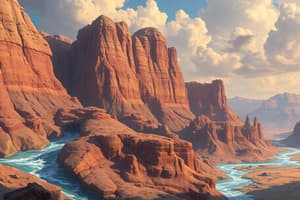Podcast
Questions and Answers
What is the process of breaking down or dissolving of minerals and rocks on the surface of the Earth?
What is the process of breaking down or dissolving of minerals and rocks on the surface of the Earth?
- Weathering (correct)
- Mass Wasting
- Sedimentation
- Erosion
Which type of weathering occurs when rainwater combines with CO2 to form a weak carbonic acid?
Which type of weathering occurs when rainwater combines with CO2 to form a weak carbonic acid?
- Oxidation
- Carbonation (correct)
- Hydrolysis
- Hydration
What type of weathering involves the breakdown of rocks by acidic water to produce clay and soluble salts?
What type of weathering involves the breakdown of rocks by acidic water to produce clay and soluble salts?
- Hydration
- Hydrolysis (correct)
- Oxidation
- Carbonation
Which weathering process involves the breakdown of rock by oxygen and water, often giving iron-rich rocks a rusty-colored weathered surface?
Which weathering process involves the breakdown of rock by oxygen and water, often giving iron-rich rocks a rusty-colored weathered surface?
What type of weathering occurs when rocks are weakened by different biological agents like plants and animals?
What type of weathering occurs when rocks are weakened by different biological agents like plants and animals?
Which exogenic process leaves significant changes on the landscape?
Which exogenic process leaves significant changes on the landscape?
What is the process of breaking down of rocks into particles without changing their chemical composition?
What is the process of breaking down of rocks into particles without changing their chemical composition?
Which process involves the upward movement of the Earth's mostly solid mantle?
Which process involves the upward movement of the Earth's mostly solid mantle?
Which type of weathering is caused by salt solutions that seep into cracks and joints in the rocks?
Which type of weathering is caused by salt solutions that seep into cracks and joints in the rocks?
What causes the mechanical break up of rock due to the expansion of freezing water in cracks?
What causes the mechanical break up of rock due to the expansion of freezing water in cracks?
Which layer of the Earth is involved in decompression melting at divergent plate boundaries?
Which layer of the Earth is involved in decompression melting at divergent plate boundaries?
What is the process of transporting weathered sediments by wind, water, or ice, and gravity to a different place?
What is the process of transporting weathered sediments by wind, water, or ice, and gravity to a different place?
Flashcards are hidden until you start studying
Study Notes
Weathering
-
Weathering is the process of breaking down rocks into smaller particles, through physical or chemical changes.
-
Chemical weathering, involves changes in the chemical composition of rocks.
-
Carbonation is a type of chemical weathering where rainwater combines with CO2 to form a weak carbonic acid. The acidic water then reacts with minerals in rocks, breaking them down.
-
Hydrolysis is the process where water molecules react with minerals in rocks, breaking them down and creating clay minerals and soluble salts.
-
Oxidation, occurs when iron-rich minerals in rocks react with oxygen and water. This process often gives rocks a rusty-colored weathered surface.
-
Biological weathering is the breakdown of rocks by living organisms, such as plants, animals, and microorganisms.
Erosion
- Erosion is the process of transporting weathered sediments from one location to another, by agents like wind, water, ice, or gravity.
Other Geomorphic Processes
-
Physical weathering is the mechanical breakdown of rocks without changing their chemical composition. This process can be caused by factors like temperature changes, abrasion, or the growth of ice crystals.
-
Decompression Melting happens at divergent plate boundaries. It’s the process where rocks melt due to a decrease in pressure, caused by plates moving apart.
-
Mantle Convection involves the movement of the Earth’s mostly solid mantle, driven by heat from the earth’s core.
-
Salt Weathering occurs when salt solutions seep into cracks and joints in rocks, which can cause the rocks to break apart as the salt crystallizes and expands.
-
Freeze-Thaw Weathering occurs when water freezes in cracks within rocks. As the water freezes, it expands and puts pressure on the rock. When the ice melts, the pressure is released, weakening the rock. Repeated freeze-thaw cycles can cause rocks to break apart.
Studying That Suits You
Use AI to generate personalized quizzes and flashcards to suit your learning preferences.




